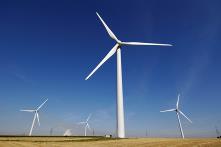Northwest Workforce Training on Smart Grid > Graduate Courses > U3/G1
Course Description
 Goals
Goals
To introduce students to
- Theory of electric energy generation systems.
- Modeling and analysis of power generation system
- Renewable resources
Learning Objectives
At the end of this course, you will be able to
- Understand the function of the basic elements of energy system generation
- Understand the environmental impact of electric power generation
- Understand the operation of the power system with conventional and renewable resources
- Understand how renewable system operates
Textbook
Electric Energy: An Introduction, Second Edition by Mohamed A. El-Sharkawi, CRC press, 2008
Additional Material
- Lecture material
- Web material
Course Prerequisites by Topic
- Integral and differential calculus
- Physics of electricity
Topics
- Energy resources
- Environmental impact of electricity generation
- Conventional power plants
- Wind energy
- Solar energy
- Fuel cell energy
- Hydrokinetic energy
- Geothermal energy
Course Structure
- Each lecture is 50-minute
- You are expected to complete about 40 lectures
- After each module, you are assigned a homework.
Computer Resources
Lecture material, homework and lab assignments are posted on the class web page
Grading
50% on the homework
50% on the final exam
ABET Outcome Coverage
a) An ability to apply math, science and engineering. Students use mathematical models of various elements of energy systems including generators, turbines, power electronic circuits, transformers and transmission system. (H)
i) A recognition of the need for, and an ability to engage in life-long learning. The course material contains areas where technologies are not fully developed yet. The students are encouraged to search the web and other resources and learn on their own the advances in various relating technologies. (L)
j) Knowledge of contemporary issues. Attention is given on current energy issues such as deregulation and renewable energy (L)
k) Ability to use the techniques, skills, and modern engineering tools necessary for engineering practice. The students are utilizing the web to obtain copies of the lecture material, to receive and/or deliver their homework or labs. The web is also used as a supplemental source of research material. (M)
m) Knowledge of differential equations, linear algebra, complex variables and discrete mathematics. The analysis of energy systems involves differential and integral calculus and circuit analysis. (H)
Prepared By: Mohamed A. El-Sharkawi
Last revised: 12/3/11






